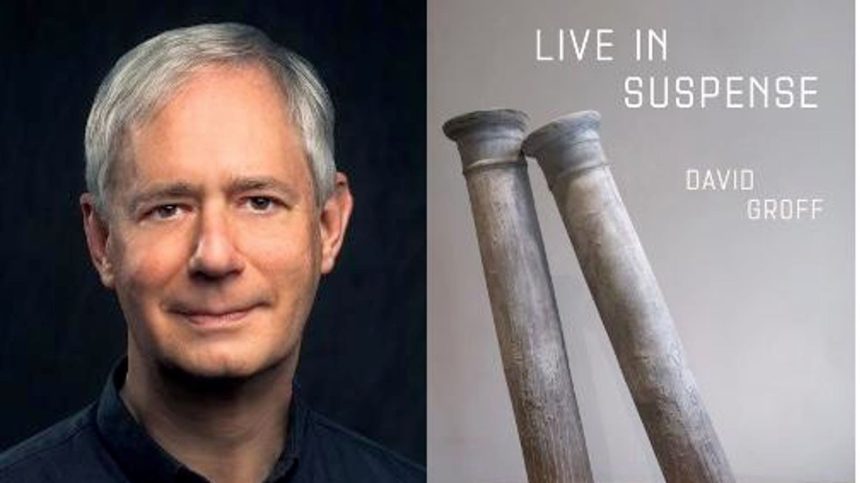David Groff, a celebrated poet, educator, and literary executor, navigates the complexities of the literary world with a passion for both creating and preserving resonant words. His most recent collection of poetry, Live in Suspense, explores themes of anticipation, transition, mortality, and the enduring power of love, all while carrying the echoes of past voices he feels responsible for ushering into the present. The collection’s title, born from a moment of poignant anticipation before a life-altering revelation, sets the tone for a body of work that probes the human experience of waiting for the “next mortal thing,” a theme particularly resonant for Groff as he reflects on his own life’s journey and the ever-present awareness of mortality. This awareness is further sharpened by the backdrop of the AIDS crisis, a period that profoundly shaped Groff’s generation and continues to inform his creative explorations.
Groff’s personal life, particularly his enduring relationship with his husband, Clay, forms a significant undercurrent in his poetry. Clay, whom Groff met in a serendipitous encounter on Fire Island nearly three decades ago, serves as both muse and touchstone, his presence woven into the fabric of Groff’s work. This deep connection fuels an exploration of love’s complexities and its ability to endure through life’s trials, including Clay’s HIV-positive status, which has added another layer to Groff’s contemplation of mortality and the interwoven nature of love, loss, and resilience. The collection isn’t simply a reflection on personal experience; it also becomes a vessel for exploring broader themes of human connection and the search for meaning in the face of life’s inevitable challenges.
The specter of death and dying, particularly in the context of the HIV/AIDS epidemic, haunts Live in Suspense, a reflection of Groff’s coming-of-age during the crisis. This experience has indelibly marked his understanding of life and loss, shaping his poetic voice and imbuing it with a profound sense of empathy and urgency. He approaches these difficult subjects with both rage and tenderness, as noted by poet Jan Beatty, forcing readers to confront their own humanity and find solace in the shared vulnerability that poetry can illuminate. This willingness to engage with difficult emotions and experiences is a hallmark of Groff’s work, creating a powerful connection with readers who find resonance in his honest and unflinching exploration of life’s complexities.
Beyond his personal experiences, Groff’s upbringing in a religious household, as the son of an Episcopal priest, has left an indelible mark on his writing. The rhythms and rituals of the church, the weight of Protestant responsibility and guilt, have permeated his creative consciousness, finding expression in poems that grapple with faith, doubt, and the search for spiritual meaning. This religious background provides a rich tapestry against which Groff explores the complexities of human existence, the interplay of the sacred and the secular, and the ongoing quest for understanding in a world often fraught with uncertainty.
In addition to his role as a poet, Groff actively contributes to the literary landscape as a professor, editor, and literary executor. He views these diverse roles as interconnected expressions of his vocation, a calling to cultivate and disseminate resonant words. This dedication extends beyond his own creative endeavors to encompass the preservation and promotion of other writers’ work, particularly those who have passed away. As the executor for the estate of Paul Monette and the custodian of unpublished works by a former partner, Groff embraces the responsibility of carrying these voices forward, striving to keep them vital and relevant for contemporary audiences. He considers this literary stewardship not merely an act of preservation but a dynamic engagement with the literary past, ensuring that these voices continue to resonate and contribute to ongoing cultural conversations.
Groff’s commitment to fostering a sustainable literary culture is evident in his multifaceted approach, which combines creative output with mentorship and literary advocacy. He recognizes the challenges of engaging readers in a digital age marked by shortened attention spans and readily available distractions. However, he remains optimistic about the enduring power of poetry, encouraging readers to approach it with an open mind and a willingness to slow down. By emphasizing the meditative qualities of poetry and its ability to evoke deep emotional responses, Groff seeks to reconnect readers with the core power of language and its capacity to illuminate the human experience. His work, both as a poet and a champion of literature, reflects a deep-seated belief in the importance of preserving and promoting voices from the past while nurturing new voices for the future, ensuring the continued vitality of the literary landscape.



